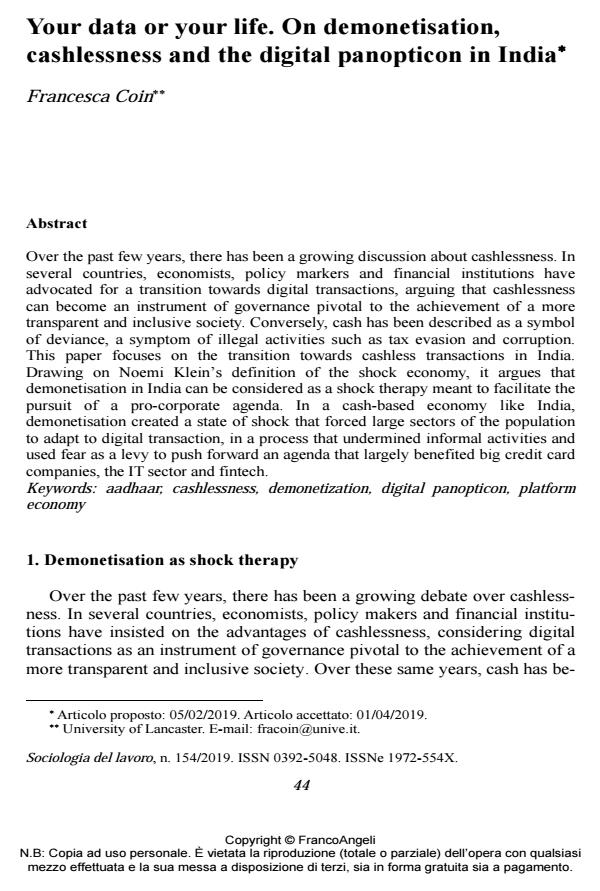Your data or your life. On demonetisation, cashlessness and the digital panopticon in India
Titolo Rivista SOCIOLOGIA DEL LAVORO
Autori/Curatori Francesca Coin
Anno di pubblicazione 2019 Fascicolo 2019/154
Lingua Inglese Numero pagine 16 P. 44-59 Dimensione file 188 KB
DOI 10.3280/SL2019-154003
Il DOI è il codice a barre della proprietà intellettuale: per saperne di più
clicca qui
Qui sotto puoi vedere in anteprima la prima pagina di questo articolo.
Se questo articolo ti interessa, lo puoi acquistare (e scaricare in formato pdf) seguendo le facili indicazioni per acquistare il download credit. Acquista Download Credits per scaricare questo Articolo in formato PDF

FrancoAngeli è membro della Publishers International Linking Association, Inc (PILA), associazione indipendente e non profit per facilitare (attraverso i servizi tecnologici implementati da CrossRef.org) l’accesso degli studiosi ai contenuti digitali nelle pubblicazioni professionali e scientifiche.
Over the past few years, there has been a growing discussion about cashlessness. In several countries, economists, policy markers and financial institutions have advocated for a transition towards digital transactions, arguing that cashlessness can become an instrument of governance pivotal to the achievement of a more transparent and inclusive society. Conversely, cash has been described as a symbol of deviance, a symptom of illegal activities such as tax evasion and corruption. This paper focuses on the transition towards cashless transactions in India. Drawing on Noemi Klein’s definition of the shock economy, it argues that demonetisation in India can be considered as a shock therapy meant to facilitate the pursuit of a pro-corporate agenda. In a cash-based economy like India, demonetisation created a state of shock that forced large sectors of the population to adapt to digital transaction, in a process that undermined informal activities and used fear as a levy to push forward an agenda that largely benefited big credit card companies, the IT sector and fintech.
Negli ultimi anni, c’è stata una crescente discussione sulla cashless society. In diversi paesi, economisti, policy markers e istituzioni finanziarie si sono espressi a favore di una transizione verso le transazioni digitali, sostenendo che la mancanza di contanti può diventare uno strumento di governance fondamentale per la realizzazione di una società più trasparente e inclusiva. Al contrario, il denaro contante è stato descritto come simbolo di devianza, sintomo di attività illegali come l’evasione fiscale e la corruzione. Il presente articolo si concentra sulla transizione verso operazioni senza contanti in India. Basandosi sulla definizione di Noemi Klein di shock economy, esso sostiene che la demonetizzazione in India può essere considerata come una terapia d’urto che ha costretto ampi settori della popolazione ad adattarsi alle transazioni digitali, in un processo che ha minato alla base l’economia informale e ha usato lo shock come una leva per portare avanti un’agenda che ha portato grandi società di carte di credito, il settore IT e il fintech.
Parole chiave:Aadhaar, cashlessness, demonetizzazione, panopticon digitale
- Between Strategies and Contingencies: Boundaries Between Subaltern Women in Rural North India Misako Kanno, in South Asia Multidisciplinary Academic Journal /2022
DOI: 10.4000/samaj.7849
Francesca Coin, Your data or your life. On demonetisation, cashlessness and the digital panopticon in India in "SOCIOLOGIA DEL LAVORO " 154/2019, pp 44-59, DOI: 10.3280/SL2019-154003